B2U5第一课时
B2U5课文翻译及课后练习答案 (1)
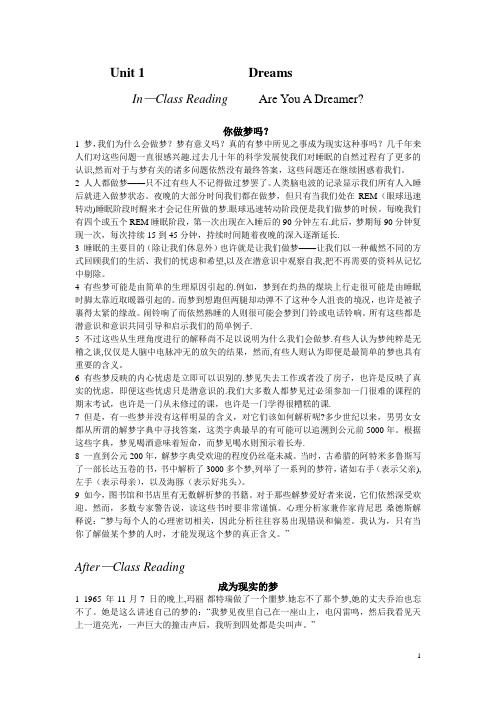
Unit 1 DreamsIn—Class Reading Are You A Dreamer?你做梦吗?1 梦,我们为什么会做梦?梦有意义吗?真的有梦中所见之事成为现实这种事吗?几千年来人们对这些问题一直很感兴趣.过去几十年的科学发展使我们对睡眠的自然过程有了更多的认识,然而对于与梦有关的诸多问题依然没有最终答案,这些问题还在继续困惑着我们。
2 人人都做梦——只不过有些人不记得做过梦罢了。
人类脑电波的记录显示我们所有人入睡后就进入做梦状态。
夜晚的大部分时间我们都在做梦,但只有当我们处在REM(眼球迅速转动)睡眠阶段时醒来才会记住所做的梦.眼球迅速转动阶段便是我们做梦的时候。
每晚我们有四个或五个REM睡眠阶段,第一次出现在入睡后的90分钟左右.此后,梦期每90分钟复现一次,每次持续15到45分钟,持续时间随着夜晚的深入逐渐延长.3 睡眠的主要目的(除让我们休息外)也许就是让我们做梦——让我们以一种截然不同的方式回顾我们的生活、我们的忧虑和希望,以及在潜意识中观察自我,把不再需要的资料从记忆中剔除。
4 有些梦可能是由简单的生理原因引起的.例如,梦到在灼热的煤块上行走很可能是由睡眠时脚太靠近取暖器引起的。
而梦到想跑但两腿却动弹不了这种令人沮丧的境况,也许是被子裹得太紧的缘故。
闹铃响了而依然熟睡的人则很可能会梦到门铃或电话铃响。
所有这些都是潜意识和意识共同引导和启示我们的简单例子.5 不过这些从生理角度进行的解释尚不足以说明为什么我们会做梦.有些人认为梦纯粹是无稽之谈,仅仅是人脑中电脉冲无的放矢的结果,然而,有些人则认为即便是最简单的梦也具有重要的含义。
6 有些梦反映的内心忧虑是立即可以识别的.梦见失去工作或者没了房子,也许是反映了真实的忧虑,即便这些忧虑只是潜意识的.我们大多数人都梦见过必须参加一门很难的课程的期末考试,也许是一门从未修过的课,也许是一门学得很糟糕的课.7 但是,有一些梦并没有这样明显的含义,对它们该如何解析呢?多少世纪以来,男男女女都从所谓的解梦字典中寻找答案,这类字典最早的有可能可以追溯到公元前5000年。
新人教版高中英语必修第二册 Unit 5THE VIRTUAL CHOIR精美课件
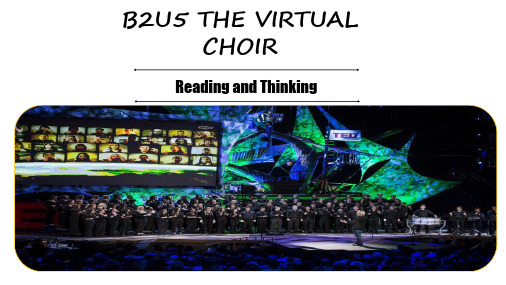
The place where he studied musical composition.
University of Nevada.
The name of his song.
“What if”.
Scan and Detect Q
请按暂停键, 停3分钟,阅读
Para I WWhhaatt...i?s a Virtual Choir? Para II WWhhoo..c.?reated it? Para III HHoww...w? as it created?
V-ed used as adverbial (状语)
Find and Think
请按暂停键, 停2分钟,阅读
1. What's the function of“Imagine having the opportunity to...”? (P1L1)
It invites the readers to imagine and experience. Thus, it attracts the readers to read.
views (L4)
ppupeerrloffooarrdmm(aeL--3nr --)ceptrraondccsulllaaacssetsseiidccdsmbbuysyiCcXCuTVYuanchonaphgweonroldmweindoen(L4)=
download
everlasting classics
phenomenon.
Encyclopedic knowledge
phonograph
radio
CD
tape Virtual Choir
Project
B2U5 过去分词做表语和状语(1)
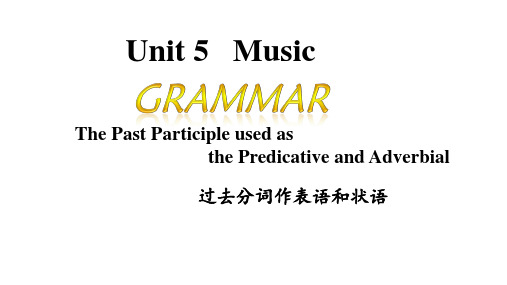
to tears. (move) ④We get _ex_c_i_t_ed__ when we see this _e_x_c_it_in__g picture. (excite)
③ Although he was mocked at by everybody, he had my sympathy. (让步)
Mocked at by everybody, he had my sympathy.
④ Because/As he was greatly touched by the teacher's words, the boy did a lot of things to help his classmates.(原因)
读下列句子,说出过去分词和现在分词在句中作表语的区别。 1.All of us were so disappointed at his absence.
2.Climbing is tiring and we are completely tired after a day's climbing. Difference: 过去分词和现在分词作表语都用于说明主语“怎么样”. 现在分词表 _主__语__的__特__点__/_特__征__,__含__有__“__令__人__…__…__”__之__意_; 而过去分词表_主__语__的__状__态__,__含__“__感__到__…__…__”__之__意_______。
(2)When it is seen from the top of the hill,the park looks more beautiful.
B2U5-《英语2基础模块》教学设计方案-6课时
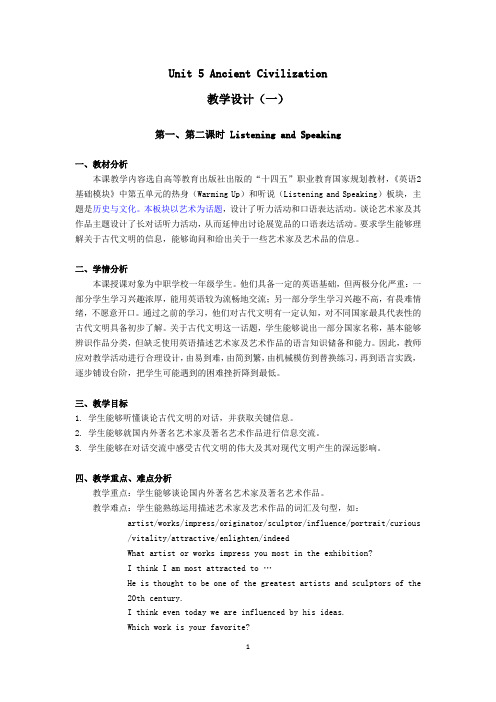
Unit 5 Ancient Civilization教学设计(一)第一、第二课时 Listening and Speaking一、教材分析本课教学内容选自高等教育出版社出版的“十四五”职业教育国家规划教材,《英语2 基础模块》中第五单元的热身(Warming Up)和听说(Listening and Speaking)板块,主题是历史与文化。
本板块以艺术为话题,设计了听力活动和口语表达活动。
谈论艺术家及其作品主题设计了长对话听力活动,从而延伸出讨论展览品的口语表达活动。
要求学生能够理解关于古代文明的信息,能够询问和给出关于一些艺术家及艺术品的信息。
二、学情分析本课授课对象为中职学校一年级学生。
他们具备一定的英语基础,但两极分化严重:一部分学生学习兴趣浓厚,能用英语较为流畅地交流;另一部分学生学习兴趣不高,有畏难情绪,不愿意开口。
通过之前的学习,他们对古代文明有一定认知,对不同国家最具代表性的古代文明具备初步了解。
关于古代文明这一话题,学生能够说出一部分国家名称,基本能够辨识作品分类,但缺乏使用英语描述艺术家及艺术作品的语言知识储备和能力。
因此,教师应对教学活动进行合理设计,由易到难,由简到繁,由机械模仿到替换练习,再到语言实践,逐步铺设台阶,把学生可能遇到的困难挫折降到最低。
三、教学目标1. 学生能够听懂谈论古代文明的对话,并获取关键信息。
2. 学生能够就国内外著名艺术家及著名艺术作品进行信息交流。
3. 学生能够在对话交流中感受古代文明的伟大及其对现代文明产生的深远影响。
四、教学重点、难点分析教学重点:学生能够谈论国内外著名艺术家及著名艺术作品。
教学难点:学生能熟练运用描述艺术家及艺术作品的词汇及句型,如:artist/works/impress/originator/sculptor/influence/portrait/curious/vitality/attractive/enlighten/indeedWhat artist or works impress you most in the exhibition?I think I am most attracted to …He is thought to be one of the greatest artists and sculptors of the20th century.I think even today we are influenced by his ideas.Which work is your favorite?五、教学过程Step 1 Warming Up*1. 铺垫活动: Brainstorm.激活知识储备:学生头脑风暴,说出关于古代发明他们能联想到的事物及其英文表达,教师可适当提供图片作为提示以激活学生思维。
高一英语(下)上学期(B2U5)词汇复习
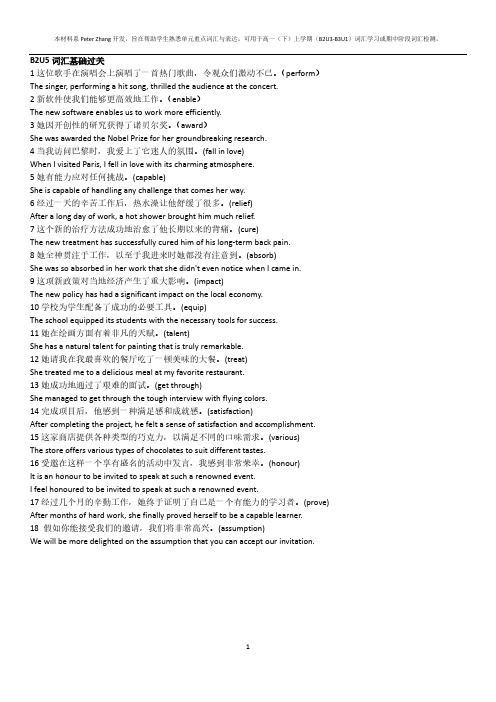
本材料系Peter Zhang开发,旨在帮助学生熟悉单元重点词汇与表达。
可用于高一(下)上学期(B2U3-B3U1)词汇学习或期中阶段词汇检测。
B2U5词汇基础过关1这位歌手在演唱会上演唱了一首热门歌曲,令观众们激动不已。
(perform)The singer, performing a hit song, thrilled the audience at the concert.2新软件使我们能够更高效地工作。
(enable)The new software enables us to work more efficiently.3她因开创性的研究获得了诺贝尔奖。
(award)She was awarded the Nobel Prize for her groundbreaking research.4当我访问巴黎时,我爱上了它迷人的氛围。
(fall in love)When I visited Paris, I fell in love with its charming atmosphere.5她有能力应对任何挑战。
(capable)She is capable of handling any challenge that comes her way.6经过一天的辛苦工作后,热水澡让他舒缓了很多。
(relief)After a long day of work, a hot shower brought him much relief.7这个新的治疗方法成功地治愈了他长期以来的背痛。
(cure)The new treatment has successfully cured him of his long-term back pain.8她全神贯注于工作,以至于我进来时她都没有注意到。
(absorb)She was so absorbed in her work that she didn't even notice when I came in.9这项新政策对当地经济产生了重大影响。
大学英语新视野视听说(第三版)B2U5课件

• W: Uh, no …
• M: You’re jumping to conclusions – and they’re all wrong! I’m from Santa Fe! It does have a
• small population – but it’s an amazing place! The history and architecture are unique. The city
people! You know how many people live in Santa • Fe? • M: Not exactly, but, listen! • W: Well, I looked up the population and it’s like
70,000! Tiny! It really is a great job for John – • my husband, but in a small town! I’m sure there will
• center was built in the 1600s by the Spanish. It’s full of beautiful shops, restaurants, coffee
• shops, and art galleries. It has amazing nightlife – full of wonderful people. That’s why famous
Hale Waihona Puke • TS: So, we thought we would try and get these cast-aside被抛弃的 old
people heard again. And what better way than record a charity single慈善 单曲, and try and storm席卷 the
《牛津小学英语2B》Unit5教案.doc
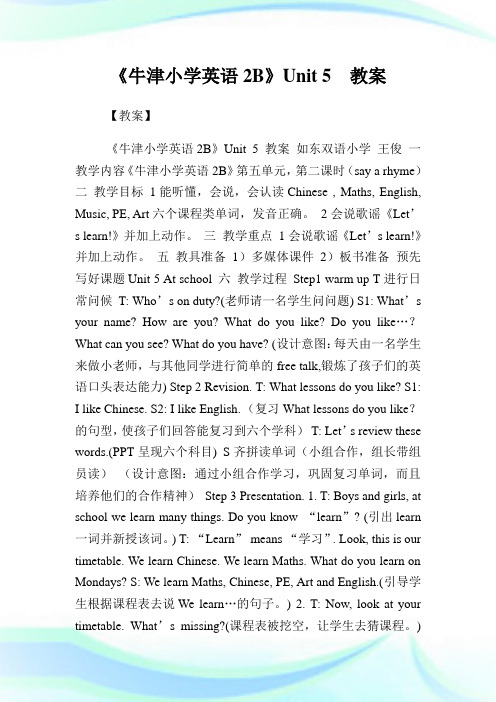
《牛津小学英语2B》Unit 5 教案【教案】《牛津小学英语2B》Unit 5 教案如东双语小学王俊一教学内容《牛津小学英语2B》第五单元,第二课时(say a rhyme)二教学目标1能听懂,会说,会认读Chinese , Maths, English, Music, PE, Art六个课程类单词,发音正确。
2会说歌谣《Let’s learn!》并加上动作。
三教学重点1会说歌谣《Let’s learn!》并加上动作。
五教具准备1)多媒体课件2)板书准备预先写好课题Unit 5 At school 六教学过程Step1 warm up T进行日常问候T: Who’s on duty?(老师请一名学生问问题) S1: What’s your name? How are you? What do you like? Do you like…?What can you see? What do you have? (设计意图:每天由一名学生来做小老师,与其他同学进行简单的free talk,锻炼了孩子们的英语口头表达能力) Step 2 Revision. T: What lessons do you like? S1: I like Chinese. S2: I like English. (复习What lessons do you like?的句型,使孩子们回答能复习到六个学科)T: Let’s review these words.(PPT呈现六个科目) S齐拼读单词(小组合作,组长带组员读)(设计意图:通过小组合作学习,巩固复习单词,而且培养他们的合作精神)Step 3 Presentation. 1. T: Boys and girls, at school we learn many things. Do you know “learn”? (引出learn 一词并新授该词。
) T: “Learn”means “学习”. Look, this is our timetable. We learn Chinese. We learn Maths. What do you learn on Mondays? S: We learn Maths, Chinese, PE, Art and English.(引导学生根据课程表去说We learn…的句子。
新编大学英语(第四版)综合教程2教学课件B2U5 Reading 1
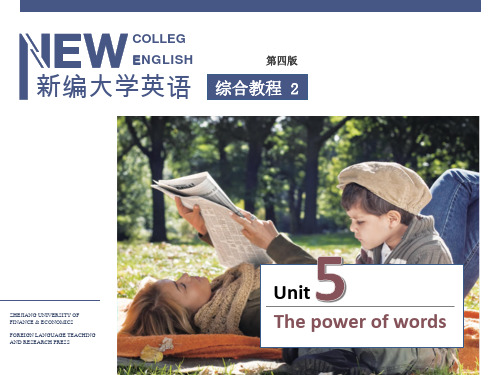
Reading 1 Text exploration
Pre-reading questions
1. Do you like reading? What kind of books do you like to read? 2. Which book has a tremendous impact on you? 3. Have you ever made some friends through reading?
First, reading can improve our writing skills. In addition to expanding our vocabulary, exposure to published, well-written works has a positive effect on our own writing. Many successful authors gain their expertise by reading the works of others. The various styles of works we have read will eventually be reflected in our own writing style.
Sample answer:
国际交流英语视听说B2U5
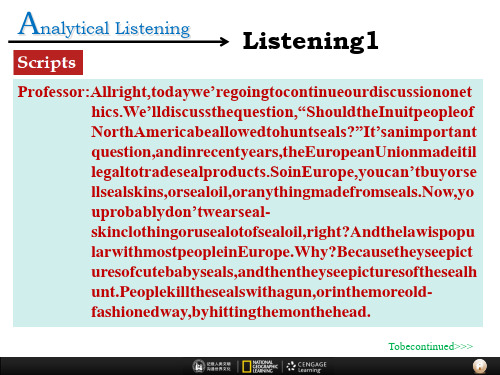
many plants can grow in such a cold climate, so people
there can’t raise crops such as rice or wheat. Therefore,
the Inuit people have a special relationship with animals.
To be continued >>>
Analytical Listening
Listening 1
Student 2: I’m wondering what’s ahead for the Inuit people—you know, what will their future be like? I mean, they can’t control the laws in Europe, right?
and beautiful scenery. Dakarai: Yes, and there are jobs there—mostly in tourism and
fishing. Jasmine: Sure—there must be a lot of fish in Lake Kariba. Dakarai: That’s right, Jasmine—a lot of fish, and it’s a great place
Analytical Listening
Listening1
Professor:Allright,todaywe’regoingtocontinueourdiscussiononet hics.We’lldiscussthequestion,“ShouldtheInuitpeopleof NorthAmericabeallowedtohuntseals?”It’sanimportant question,andinrecentyears,theEuropeanUnionmadeitil legaltotradesealproducts.SoinEurope,youcan’tbuyorse llsealskins,orsealoil,oranythingmadefromseals.Now,yo uprobablydon’twearsealskinclothingorusealotofsealoil,right?Andthelawispopu larwithmostpeopleinEurope.Why?Becausetheyseepict uresofcutebabyseals,andthentheyseepicturesofthesealh unt.Peoplekillthesealswithagun,orinthemoreoldfashionedway,byhittingthemonthehead.
高一英语课件 B2U5 Music:Reading and Thinking

Summarize & reflect
What is a Virtual Choir? Who created it? How was it created? How did it affect us?
In what ways can we enjoy and admire music? The CDs The radio
The live performance and concert
The TV
My classmates/ friends
The computers and Internet
2018周杰伦“地表最强”演唱会
do not have close friends or contacts who ...
Reasons do not have the chance to join a local choir
help connect ordinary people together enable them to add their voices to those of other individuals Significance become part of the global community be a positive influence on the lives of many people
The creation
P4 How did it affect us?
The influence
What is a Virtual Choir? Who created it? How was it created? How did it affect us?
必修二unit 5-词汇讲解

单词表中的短语及拓展:
1. dream of / about 梦想… 2. to be honest 说实话
honestly speaking 3. attach … to … 系上,缚上,附加,连接
attach great importance to 认为…很重要 attach great value to 认为..有价值 4. in cash 用现金 5. play jokes / a joke on 戏弄,开玩笑 play a trick on make fun of laugh at 6. rely on 依靠,依赖 depend on 取决于,依靠
课文(含练习)中的短语:
1. begin as… 以…形式开始 2. pretend to do sth. 假装做某事 3. be based on 以…为基础 4. give performances (to sb.) 表演 5. be serious about 认真对待… 6. in the mid-1980s 在20世纪80年代中期 7. in different directions 往不同的方向 8. by cheque 用支票(支付) 9. have a good knowledge of 对…很了解 10. to one’s great surprise 令某人很惊讶的是 11. for the first time 第一次 12. make up 组成,编造,弥补,占(…百分比)
12. familiar (adj.) → similar (adj.相似的)
13. reunite (v.) → reunion (n.)
14. attract (v.) → attractive (adj.)
捷进英语B2U5 Dinner Table of the World PPT

Possible answers Picture A: beer; juice; oranges; bananas; bread; meat; lettuce (生菜;莴苣);
tomatoes; pizza; carrots; etc Picture B: rice; fish; roast meat; bananas; watermelon; sauces; etc Picture C: coke; juice; pizza; potatoes; onions; grapes; bacon; meat; etc Picture D: spring onions (小葱); carrots; etc
改变饮食
人口增长并不是造成粮食 短缺的唯一原因。我们的 饮食(习惯)也难辞其咎。 现在,越来越多的人居住 在城市,人们吃肉越来越 多。为了生产肉类,我们 必须用更多的土地和水, 以种植喂养动物的粮食。 加工肉类也要消耗更多的 能源。结果是,我们使用 了更多的土地和资源,却 生产出了更少的食物。如 果每个人都变成素食者, 我们就能轻松养活不断增 长的人口。但谁愿意作出 这种改变呢?你愿意放弃 吃肉来养活别人吗?
文
From sending seeds into space to asking people to change their diet, these are all ways of solving the world’s food problem.
Whichever methods countries and individuals choose, we still have a long way to go.
B2U5教学设计说明
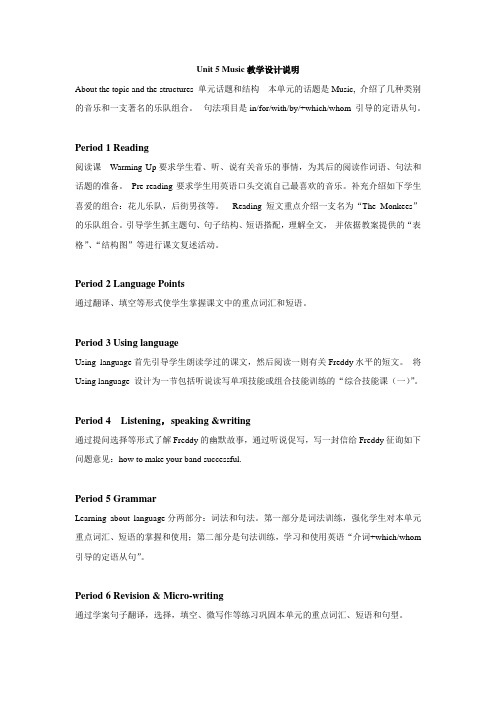
Unit 5 Music教学设计说明About the topic and the structures 单元话题和结构本单元的话题是Music, 介绍了几种类别的音乐和一支著名的乐队组合。
句法项目是in/for/with/by/+which/whom 引导的定语从句。
Period 1 Reading阅读课Warming Up要求学生看、听、说有关音乐的事情,为其后的阅读作词语、句法和话题的准备。
Pre-reading要求学生用英语口头交流自己最喜欢的音乐。
补充介绍如下学生喜爱的组合:花儿乐队,后街男孩等。
Reading短文重点介绍一支名为“The Monkees”的乐队组合。
引导学生抓主题句、句子结构、短语搭配,理解全文,并依据教案提供的“表格”、“结构图”等进行课文复述活动。
Period 2 Language Points通过翻译、填空等形式使学生掌握课文中的重点词汇和短语。
Period 3 Using languageUsing language首先引导学生朗读学过的课文,然后阅读一则有关Freddy水平的短文。
将Using language 设计为一节包括听说读写单项技能或组合技能训练的“综合技能课(一)”。
Period 4 Listening,speaking &writing通过提问选择等形式了解Freddy的幽默故事,通过听说促写,写一封信给Freddy征询如下问题意见:how to make your band successful.Period 5 GrammarLearning about language分两部分:词法和句法。
第一部分是词法训练,强化学生对本单元重点词汇、短语的掌握和使用;第二部分是句法训练,学习和使用英语“介词+which/whom 引导的定语从句”。
Period 6 Revision & Micro-writing通过学案句子翻译,选择,填空、微写作等练习巩固本单元的重点词汇、短语和句型。
新未来大学英语 视听说教程2教学课件B2U5
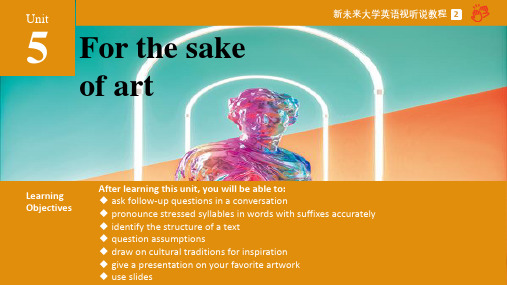
Experience the world
Listening 1
While you listen
❷ Listen to an interview with a film composer and check (✓) what it is mainly about. ☐ 1. The film composer’s biggest successes and failures. ☐ 2. The history of music in films.
Unit
5 For the sake
of art
新未来大学英语视听说教程 2
Learning Objectives
After learning this unit, you will be able to: ◆ ask follow-up questions in a conversation ◆ pronounce stressed syllables in words with suffixes accurately ◆ identify the structure of a text ◆ question assumptions ◆ draw on cultural traditions for inspiration ◆ give a presentation on your favorite artwork ◆ use slides
Experience the world
Listening 1
While you listen
❹ Listen to the interview for a third time and complete the conversation turns with the follow-up questions you hear in the recording. 1. Richard: A film’s soundtrack can make them … It can also prepare them for something that’s about to happen. Presenter: _C_a_n__y_o_u_g_i_v_e_u_s_a_n__e_x_a_m_p__le_o__f _a_f_il_m__s_o_u_n_d_t_ra_c_k_t_h_a_t___you think was particularly successful? 2. Richard: Well, anyone who has watched Crouching Tiger, Hidden Dragon will remember the music … Without it, the film would feel completely different! Presenter: Good example. _T_a_n__D_u_n__w_a_s_t_h_e__co__m_p_o_s_e_r_, _w_a_s_n_’t__h_e_?___ 3. Richard: Well, for me … the next most important part is matching the music to when and where the story happens. Presenter: So, _c_a_n_y_o_u__le_t_u__s_k_n_o_w__a_n_y_s_e_c_r_e_t_tr_i_c_ks__o_f_t_h_e_t_ra_d__e_?__
BM2U5P1-4教案设计
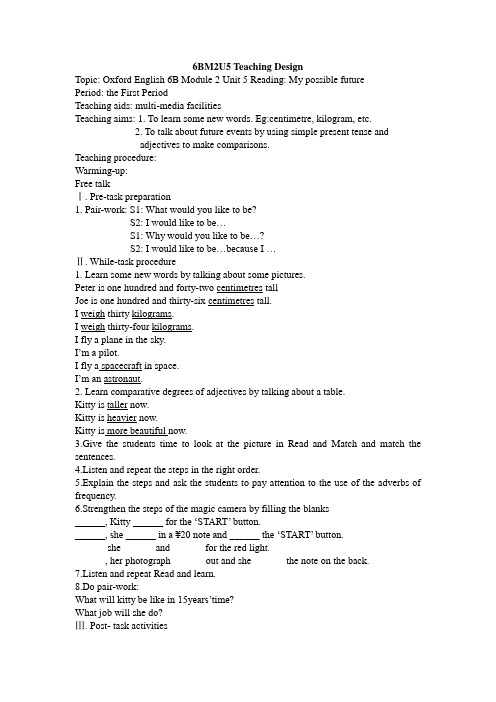
6BM2U5 Teaching DesignTopic: Oxford English 6B Module 2 Unit 5 Reading: My possible futurePeriod: the First PeriodTeaching aids: multi-media facilitiesTeaching aims: 1. To learn some new words. Eg:centimetre, kilogram, etc.2. To talk about future events by using simple present tense andadjectives to make comparisons.Teaching procedure:Warming-up:Free talkⅠ. Pre-task preparation1. Pair-work: S1: What would you like to be?S2: I would like to be…S1: Why would y ou like to be…?S2: I would like to be…because I …Ⅱ. While-task procedure1. Learn some new words by talking about some pictures.Peter is one hundred and forty-two centimetres tallJoe is one hundred and thirty-six centimetres tall.I weigh thirty kilograms.I weigh thirty-four kilograms.I fly a plane in the sky.I’m a pilot.I fly a spacecraft in space.I’m an astronaut.2. Learn comparative degrees of adjectives by talking about a table.Kitty is taller now.Kitty is heavier now.Kitty is more beautiful now.3.Give the students time to look at the picture in Read and Match and match the sentences.4.Listen and repeat the steps in the right order.5.Explain the steps and ask the students to pay attention to the use of the adverbs of frequency.6.Strengthen the steps of the magic camera by filling the blanks______, Kitty ______ for the ‘START’ button.______, she ______ in a ¥20 note and ______ the ‘START’ button.______ she ______ and ______ for the red light.______, her photograph ______ out and she ______ the note on the back.7.Listen and repeat Read and learn.8.Do pair-work:What will kitty be like in 15years’time?What job will she do?Ⅲ. Post- task activitiesAsk the students to talk their possible future in groups.Ⅳ.Consolidation1. Read and recite the text on page 332. Say something about your possible future orally.Topic: Oxford English 6B Module 2 Unit 5 Reading: My possible futurePeriod: the Second Period (★或参照二集公开课资料)Teaching aids: multi-media facilitiesTeaching aims:1. To know the new words: good-looking, slim, good at, centimetre, weigh, possibly,reporter, baker, singer2. To talk about future events by using adj..3. To use formulaic expression to show agreement/disagreemente.g.Yes, I agree. / No, I don’t agree.Teaching procedure:Pre-task preparationMake some sentences about different jobs.e.g. A teacher teaches children.Let the students make some sentences about jobs like the example.While –task procedureLook and learn:Slide 1: What does this woman usually do? (sing)What job does she do? (singer)( baker , reporter,…)Slide 2: show the picture of the singer?How is this woman?(To teach good-looking, slim…)Slide 3: She always gets A in English tests.She is good at English.She sings very well.We can also say she is good at singing.Slide 4: show the picture of the reporter.Slide 5: show the picture of a ruler and a scale to review the word: centimerte and weighSlide 6: pair work: make the dialogue with your deskmateHow much do _____ weigh?_______ weigh ________.Slide 7: show the picture of the baker. Complete the sentences:He is a __________.He _______ 75 kg.He is __________.He is good at ___________________.Read and say1.Play the cassette for the first description in Read and say2. Ask questions:What does Peter love doing?What is he good at?What will he be like in 15 years’ time?What will he do?3. Students look at the screen and read after the tape to imitate the intonation4. Play the cassette for the second description in Read and say5. Ask questions:What does Jill love doing?What is she good at?What will she be like in 15 years’ time?How much will she weigh?6.Students look at the screen and read after the tape to imitate the intonation7.Play the cassette for the dialogue and students repeat8.Give students some time to read the whole text by themselves first then read thewhole text togetherThink and talkPair work:Talk about individual students in the class:S1: I think (Name) will be a policeman. Do you agree?S2: Yes, I agree. /No, I don’t agree. (Name) will possibly be a/an _____.Post-task procedureSlide1: think and say1. A reporter is good at _________________________________.2. A teacher is good at _________________________________.3. A football player is good at __________________________.4. A singer is good at ___________________________________.5. A pilot is good at ____________________________________.6. A cook is good at ___________________________________.7. A fisherman is good at _______________________________.8. A driver is good at ___________________________________.Slide 2: Read, guess and talkWhat will he/she possibly do?Slide 3: workbook 6B page 33(a)Give the students time to read the descriptions silently. Select individualstudents to read out a paragraph.(b)In pairs, students prepare the dialogue without writing. Select pairs to say adialogue.(c)The students write the dialogues. Select other pairs to read out a dialogue. Homework:1. Workbook 6B pages 29 and 302. Recite “Read and say”3. Write some sentences about one of your good friends, telling us about what he/she will possibly look like and what job he/she will possibly do in the future.Teaching Design 3Module 2 ChangesUnit5 What will I be like?The third periodTeaching Aims1.Reading and writing about how children will develop and what jobs they may doin the future.2.Reading about abilities and what children would like to do in the future..3.the students writing about their own abilities and preferences4.Reading a poem.Language focus:Using adverbs of sequencyE.g.: First, Next, Then,finallyUsing adjectives to make comparisonsE.g.: I’ll be taller and heavier.Using the simple future tense to talk about future events.E.g.: I’ll be an astronaut.Using the simple present tense to express interests and thoughtsE.g.: Peter loves helping people. I think Peter will be a fireman in 15 years’ time. Using formulaic expressions to show agreement /disagreement.E.g.: Yes, I agree. No, I don’t agree.Language skills:ListeningRecognize recurrent patterns in language structure.Identify details that support a main idea.SpeakingMaintain an interaction by responding to questions.Maintain an interaction by using formulaic expressions.Use appropriate intonation and stress.ReadingScan a text to locate specific information.Read written language in meaningful chunks.Identify details that support a main idea.WritingPlan and organize information by deciding on the sequence of content.Develop written texts when a framework is provided.Develop written texts by expressing own ideas.Write out a piece of work by presenting writing using appropriate layout and vidual support including illustrations.Materials:Student’s Book 6Bpage33-38Workbook 6B page28-34Cassette 6BCassette playerMultimedia M1U5I. Pre-task preparation:A: Pair- work:Look at the pictures. Make a dialogue with your deskmate.For example:S1: What job does he do?S2: He is a doctor.S1: What job does he do?S2: He makes sick people better.B: be good at doing sth.Pair -work:S1: What is a driver good at?S2: A driver is good at ___________________________________.S1: What is a reporter good at?S2: A reporter is good at _________________________________.S1: What is a teacher good at?S2: A teacher is good at _________________________________.S1: What is a football player good at?S2: A football player is good at __________________________.S1: What is a singer good at?S2: A singer is good at ___________________________________.S1: What is a pilot good at?S2: A pilot is good at ____________________________________.S1: What is a cook good at?S2: A cook_______________________________________.S1: What is a fisherman good at?S2: A fisherman is good at _______________________________.C: Read a poem:What will you be? What will you be, Ben? What will you be? I’ll be an astronaut. That’s what I’ll be.What will you do, Ben? What will you do?I’ll fly a spacecraft. That’s what I’ll do. What will you see, Ben? What will you see?I’ll see the stars. That’s what I’ll see.Who will go with you, Ben? Who will go with you?You’ll go with me, Kitty. You’ll go with me.When will we come back, Ben? When will we come back? We’ll come back at night. That’s when we’ll come back.D: Write a poem:What will you be?What will you be, _____? What will you be?I’ll be _____.That’s what I’ll be.What will you do, _____? What will you do?I’ll ______.That’s what I’ll do.What will you see, _____? What will you see? I’ll see _____.That’s what I’ll see.Who will go with you, _____? Who will go with you?_____’ll go with me.You’ll go with me.When will we come back, _____? When will we come back? We’ll come back _____.That’s when we’ll come back.II. While-task procedure:A: Listen and write1. Listen to the tape and fill in the table: Things he loves_________________ Things he is good at ______________ Possible height _________________ Possible weight ________________ Things he will do _______________ Possible job _____________________2. According to the table and make sentences:Joe loves …He is good at …In 15 years’ time, Joe will be …He will be … tall.He will weigh …He will work in …He will possibly be …Ben loves …He is good at …In 15 years’ time, Ben will be …He will not be …He wil l …He will possibly be …B: Listen and say:Listen to the tape and read after the tapeJoe loves eating cake and pizza.He is good at cooking.In 15 years’ time, Joe will be tall and strong.He will be 180 centimetres tall.He will weigh 70 kilograms.He will work in a bakery.Ben loves taking photographs.He is good at English and Chinese.In 15 years’ time, Ben will be tall, but he will not be fat.He will read and write a lot.C: Ask and answer:In pairs, talk about what Joe and Ben will be like and what they will possibly be in 15 years’ time.S1: What will Joe be like in 15 years’ time?S2: He will be _____.He will be _____ tall.He will weight _____ kilograms.S1: What will he possibly be in 15 years’ time?S2: He will possibly be a/an _____.S1: Y es, I agree. /No, I don’t agree. He will possibly be a/an _____.III. Post-task activityTalk and write1. With your desk mate, talk like this:S1: What do you love?S2: I love ________________.S1: What are you good at?S2: I am _________________.S1: What will you be like in 15 years’ time?S2: I will _______. I will be _______ tall. I will weigh _______ kilograms.S1: What job will you do?S2: I will _________________.2.Write about your desk mate, like this:____ loves ____________.He/she is good at _______ ________.In 15 years’ time, ____ will be ________. He/She will be _______ tall. He/She will weigh _________. He/ She will ______________.He/She will possibly be a/an ______.IV. Consolidation:1.Write about your friend in 15 years’ time.2.Recite the names of jobsTeaching Design 4Topic: Oxford English 6B Module 2 Unit 5 Writing: A report on my futurePeriod: the fourth periodTeaching aids: multi-media facilitiesTeaching aims: ing the simple future tense to talk about future events (e.g. will be)2. Using modal verbs to express obligation (e.g. have to)3. Thinking what you would like to be in futureTeaching procedure:I.Pre-task preparation(1)Ask and answerHave you thought of your future?What would you like to be in future?(2)Look and sayS1: What would you like to be?S2: I’d like to be a reporter.S1: What are you good at?S2: I’m good at writing.S1: What are you poor at?S2: I’m poor at taking photographs.Jobs: • driver• singer• teacher• dentist• baker• secretary• policeman• pilot• doctor • Reporter• cook• astronautII.While-task procedure(1)Give the students time to read Look and read.(2)Play the cassette. The students listen.(3)Select individual students to read out a paragraph. Ask questions:E.g. What would Alice like to be?What is she good at?What is she poor at?What does she have to practice more?What does she have to learn?(4)Listen and writeAbout JoeWhat would Joe like to be? Write a report.I will possibly be an astronaut.I am poor at _Maths_.I have to practise _Maths_ more.About AndyWhat would Andy like to be? Write a report.I will possibly be _a farmer or a singer .I would like to be a singer .I am good at _singing_.I am poor at _dancing_.I have to practise _dancing_ more.I have to learn to _dance_.III.Post- task activities(1)Read and say(A)Ken: May, do you want to be a pilot?May: No, I don’t. I’m short, so I don’t think I can be a pilot.Ken: What do you want to be, May?May: I’ll possibly be a reporter.Ken: That’s a very exciti ng job. Do you know how to take photographs? May: No. Why?Ken: Because reporters have to take a lot of photographs.May: I’ll have to learn how to take photographs then.(B)Paul: What are you reading, Sally?Sally: I’m reading a story about a very famous model in the USA. I’m quite interested in it.Paul: You are quite good-looking. Do you want to be a model?Sally: Yes.Paul: Don’t you want to be a secretary?Sally: No, that’s not a very exciting job.Paul: But models have to be tall and sl im. You’re not tall and slim.Sally: I’ll do more exercise.(2)The students prepare About you without writing. Select individual students to saya sentence about themselves.(3)The students complete the report individually.(4)Select individual students to read out their report.(5)Give the students time to interview their good friends and complete the report onpage 34 of Workbook 6B.(6)Select individual students to read out the report.IV.ConsolidationWorkbook 6B page 31。
B2U5单元课题
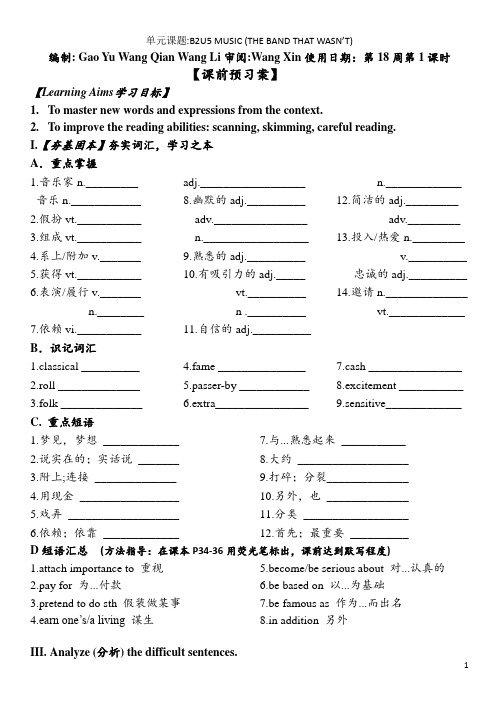
单元课题:B2U5 MUSIC (THE BAND THAT WASN’T)编制: Gao Yu Wang Qian Wang Li审阅:Wang Xin使用日期:第18周第1课时【课前预习案】【Learning Aims学习目标】1.To master new words and expressions from the context.2.To improve the reading abilities: scanning, skimming, careful reading.I.【夯基固本】夯实词汇,学习之本A.重点掌握1.音乐家n._________ 音乐n.____________2.假扮vt.___________3.组成vt.___________4.系上/附加v._______5.获得vt.___________6.表演/履行v._______n.________ 7.依赖vi.___________ adj.__________________8.幽默的adj.__________adv.________________n.__________________9.熟悉的adj.__________10.有吸引力的adj._____vt.__________n .__________11.自信的adj.__________n._____________12.简洁的adj._________adv._________13.投入/热爱n._________v.__________忠诚的adj.__________14.邀请n.______________vt._____________B.识记词汇1.classical __________2.roll ______________3.folk ______________4.fame _______________5.passer-by ____________6.extra________________7.cash ________________8.excitement ___________9.sensitive_____________C. 重点短语1.梦见,梦想_____________2.说实在的;实话说_______3.附上;连接______________4.用现金_________________5.戏弄___________________6.依赖;依靠_____________7.与...熟悉起来___________8.大约___________________9.打碎;分裂______________10.另外,也______________11.分类__________________12.首先;最重要__________D短语汇总(方法指导:在课本P34-36用荧光笔标出,课前达到默写程度)1.attach importance to 重视2.pay for 为...付款3.pretend to do sth 假装做某事4.earn one’s/a living 谋生5.become/be serious about 对...认真的6.be based on 以...为基础7.be famous as 作为...而出名8.in addition 另外III. Analyze (分析) the difficult sentences.1I.【夯基固本】见课件II. 【构建语篇】见NP16 B1版Into the text 1-4III. Fill in the blanks according to the text.注意规范答题,注意所给词汇的形式变化!IV. 【Homework】根据老师的指导预习语言点2。
新人教版高中英语必修第二册 Unit 5THE VIRTUAL CHOIR精美课件

Reading and Thinking
教学内容
Virtual (Internet)
Choir(Music)
B2U5 THE VIRTUAL CHOIR
Scan and Circle
请按暂停键, 停2分钟,阅读
The man who came up with the idea for a virtual choir.
Para IV What influence did it bring to us?
A. clear stucture B. key words C.colurful colours
My mind map
请按暂停键, 停1 分钟,阅读
Find and comprehend
Born in the USA on 2 January 1970, Whitacre began... Moved by his music, he said... Inspired, he asked his fans to make videos...
A Chinese Everlasting Classics Virtual Choir
1. The purpose of this activity. 2. The Chinese classics you choose. 3. A brief introduction to the virtual choir. 4. The deadline to upload videos.
Assignment
Make a poster to call for Chinese Classics fans from all over the world to take part in a virtual choir of Chinese classics and post it on your microblog.
pep2Unit5第1课时教案
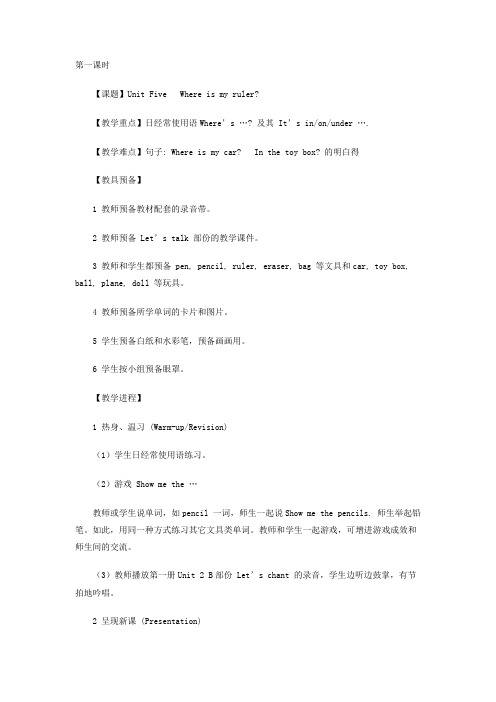
第一课时【课题】Unit Five Where is my ruler?【教学重点】日经常使用语Where’s …? 及其 It’s in/on/under ….【教学难点】句子: Where is my car? In the toy box? 的明白得【教具预备】1 教师预备教材配套的录音带。
2 教师预备 Let’s talk 部份的教学课件。
3 教师和学生都预备 pen, pencil, ruler, eraser, bag 等文具和car, toy box, ball, plane, doll 等玩具。
4 教师预备所学单词的卡片和图片。
5 学生预备白纸和水彩笔,预备画画用。
6 学生按小组预备眼罩。
【教学进程】1 热身、温习 (Warm-up/Revision)(1)学生日经常使用语练习。
(2)游戏 Show me the …教师或学生说单词,如pencil 一词,师生一起说Show me the pencils. 师生举起铅笔。
如此,用同一种方式练习其它文具类单词。
教师和学生一起游戏,可增进游戏成效和师生间的交流。
(3)教师播放第一册Unit 2 B部份 Let’s chant 的录音,学生边听边鼓掌,有节拍地吟唱。
2 呈现新课 (Presentation)(1)游戏:“捉迷藏”教师出示文具pen, pencil, ruler, eraser, bag …让学生自由用英语表述,以后告知学生:All of these are mine. They can move. Please close your eyes. 告知学生我的文具也长了脚,能够和同窗们做捉迷藏的游戏,请把眼睛闭紧。
教师将其中一个文具,如:ruler 藏在某个同窗的课桌底下,问:Where is my ruler? 学生自由讨论,能用英语的说英语,可不能的单词可做动作表示。
用此方式引出单词:in, on, under 的教学。
- 1、下载文档前请自行甄别文档内容的完整性,平台不提供额外的编辑、内容补充、找答案等附加服务。
- 2、"仅部分预览"的文档,不可在线预览部分如存在完整性等问题,可反馈申请退款(可完整预览的文档不适用该条件!)。
- 3、如文档侵犯您的权益,请联系客服反馈,我们会尽快为您处理(人工客服工作时间:9:00-18:30)。
答案
1.pretended 2. attach 3 familiar 4. broke up 5 confident 6 To be honest 7 broke up
8 in cash 9 dreamed of 10 In addition
1.To be honest, a lot of peopleattach great importance tobecoming rich and
_____________________________________________________________
3.然而经过大约一年以后,门基乐队逐渐对自己的工作认真起来
_____________________________________________________________
_____________________________________________
______________________________________________
5.所以他们离开英国再也不想回来,他们又回到湖里.
____________________________________________________
__________________________________________________________________________
第2页
巩固学案
学生笔记(教师点拨)
学案内容
4.1996年他们推出了一张新的专辑像真正的乐队一样以此来庆祝他们以往的时光。
______________________________________________
1.She _____________she didn't know me when we met in the street.
班级小组姓名________使用时间______年______月______日编号
第1页
学案内容
学生笔记(教师点拨)
2.The country should _____________ great importance to energy saving and environment protection.
3.Being a native of the city, he is ____________ with all the streets here.
4.The meeting __________________ at eleven o’clock.
5.He was ______________that he would be admitted to the famous university.
II.Read the text aloud and revise the new words phrase and important sentences.
III.Choose the suitable words and phrases above to complete the following sentences and some more than one answer.
2.你是否曾梦想过在音乐会上面对成千上万的观众演唱,观众欣赏你的歌唱为你鼓掌吗?
_____________________________________________________________
_____________________________________________________________
山东省昌乐一中2011级
高三英语课时学案
课题
Book 2 Unit 5 Music
第一课时
编制人
审核人
学习
目标与
评价
设计
目标及要求
识记
理解
应用
To grasp the key words, phrases and sentences.
To use the words, phrases and sentences freely.
______________________________________________________________________________________________________________
_______________________________________________________
4.They produced a new record in 1996,with which they celebrated their former time as a real band.
5.So they left Britain, to which they were never to return, and went back to the lake.
IV. Translate the following sentences and commit them to memory.
1.说实在的,很多人把名和利看得很重。
_____________________________________________________________
_____________________________________________________________
历史
To be devoted to the class with passion.
重点难点
课堂学案
学生笔记(教师点拨)
学案内容
【新知学习】
【课内探究】
I. Free talk:
Why do you think music is important?(Try your best to use some useful expressions in this unit)
famous.
2.Have you ever dreamed of playing in front of thousands of people at a concert,
at which everyog your music?
3.However, after a year or soin which they became more serious about their work,
____________________________________________________
____________________________________________________
第3页
学案内容
学生笔记(教师点拨)
自我反思
第4页
Book II Unit 5 Music
第一课时
6. __________, a lot of people attach great importance to becoming rich and famous.
7. The band _____________ about 1970, but happily they reunited in the mid-1980s.
8. The goods should be paid __________.
9 . Have you ever __________________ being admitted into a famous college?
10.___________, you should change your attitude to your study in order to make a larger progress.
